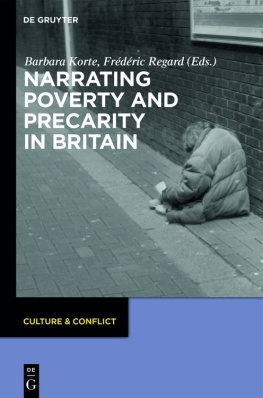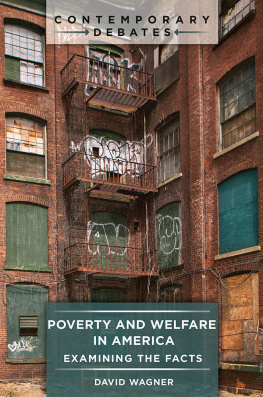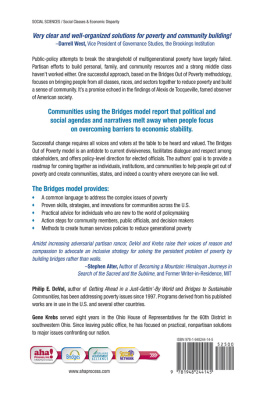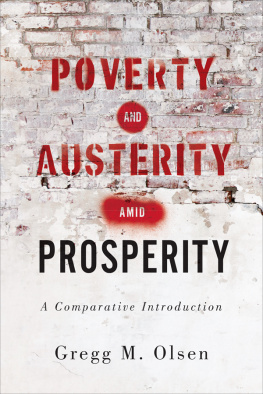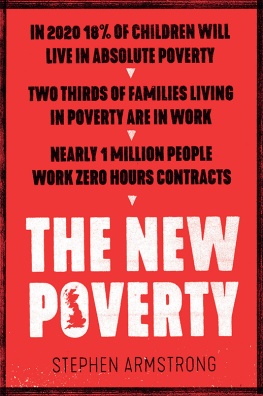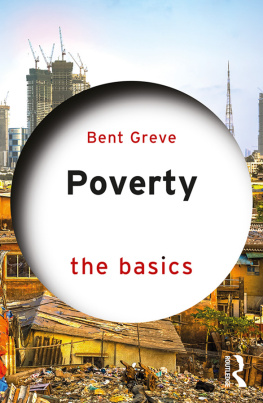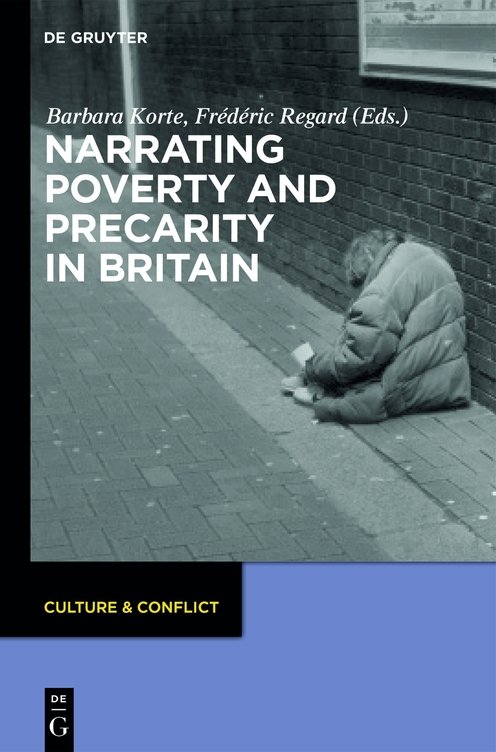The editors would like to thank Katja Bay, Natalie Churn, Kathrin Gb and Malena Klocke for their help in getting this book ready for publication, and Georg Zipp for co-organising a symposium which gave the contributors a first opportunity to discuss their ideas.
Biographies of the Contributors
Carolyn Betensky is Associate Professor of English at the University of Rhode Island, where she teaches courses on Victorian literature and critical theory. Another focus of her research is poverty, which culminated in her book Feeling or the Poor (2010).
Marie-Luise Egbert is affiliated as a Privatdozentin with the University of Leipzig. In recent years, she has taught at the University of Freiburg. Her research interests range from translation studies to poverty studies.
Joachim Frenk is Professor of British Literary and Cultural Studies at Saarland University, Saarbrcken. He specialises in early modern literature, in Victorian and contemporary literature and in cultural studies.
Helen Hester is a Senior Lecturer at Middlesex University (Mauritius Campus). She has published articles on gender and sexualities, transgression, and the abject body, and is the author of Dirty Money: Pornography and the Erotics o Consumption.
Eveline Kilian is Professor of British Cultural Studies and Cultural History in the Department of English and American Studies at Berlins Humboldt University. Her research interests include Gender Studies, discourse analysis, subject formation and narrative, and metropolitan cultures.
Barbara Korte is professor of English literature at the University of Freiburg. Her research areas include travel writing, the literature of World War I and currently the literary representation of poverty.
Romain Nguyen Van is a PhD student at the University of Paris-Sorbonne IV. Having taught undergraduate students in British Literature at the Sorbonne, he now teaches undergraduate students in Lcye Thiers (Marseille).
Frdric Regard is professor of English literature at the Sorbonne. He has written books on several twentieth-century authors and the history of British literature. He has edited collections of essays on life-writing, exploration narratives and early Arctic voyages.
Marina Remy Abrunhosa is a PhD student at the University of Paris-Sorbonne IV, where she also taught undergraduate students in British Literature. She currently teaches British Literature and translation at a Classe Prparatoire aux Grandes Ecoles in Besanon (preparing students for the ENS selective-entry exam). Her research thesis focuses on George Orwell and James Greenwood.
Joanna Rostek is a lecturer in English Literature and Culture at the University of Passau. Her research interests include the economic discourse in nineteenth-century Britain, womens/gender studies, postmodern philosophy of history, and Polish migrant literature and culture in the UK and Ireland
Georg Zipp read for his MAs at the University of Sussex and at Freiburg University. He is currently completing a PhD project on poverty in contemporary Caribbean fiction. He was also involved in a research project on figurations of poverty on the British book market.
Barbara Korte
Narrating Poverty and Precarity in Britain: An Introduction
The present volume therefore focuses on Britain, with some comparative glances at the situation in other countries and cultures, and its chapters divide their attention between current cultural production and earlier instances of poverty representation that have retained significant relevance today. Its interest in the Victorians in particular is motivated not only by
The chapters in this book are concerned with literary representations of poverty in the widest sense: novels, short stories and narrative journalism, but also plays for the stage and scripted television. All of these representations tell stories, attesting that the struggle with the meanings and consequences of our actions, which characterizes our being human, is most often understood in narrative structures as we tell others and ourselves about what has transpired or what we fear will transpire in the future (Davis and Womack 2001, ix). A special relevance of literature for the study of poverty has not only been claimed by representatives of literary studies, but has also been emphasized by sociologists, economists and moral philosophers. Pierre Bourdieu, for instance, has demanded that novels, and specifically complex ones, should become a model for the sociological representation of social suffering in order to replace simplistic and one-sided images and the single, central, dominant, in a word, quasi-divine, point of view that is all too easily adopted by observers. Instead, he argues, social misery should be described with the multiple perspectives that correspond to the multiplicity of coexisting, and sometimes directly competing, points of view (1999, 3). Since literature is attentive to the particular and can render characters inner worlds, it is an important complement to the general categories and statistics of the social and economic sciences. Literature gives faces and voices to poverty, and asks readers to see situations from the perspective of those who are afflicted (Sedmak 2003, 48). From the perspective of development studies, social scientists at the London School of Economics also contend that literary works sometimes have a stronger Geertzian being there quality than certain academic and policy works; furthermore, because they are written in a more engaging and accessible manner, they will often reach a much larger and diverse audience than academic texts and have greater influence on public knowledge and understanding (Lewis, Rodgers and Woolcock 2008, 209). Not least, they foreground the human dimension of social misery and its ethical challenge. The economist Amartya Sen (2007), a leading authority on international poverty and inequality, has cited George Bernard Shaws Major Barbara and concluded that the playwright was right, a hundred years ago today, to point to the connection between poverty and evil and crime. To Sen, the fact that this insight came from a dramatist and literary giant fits in well with [his] general thesis that the economics of poverty involves much more than just economics. Human lives in society are interlinked through economic, social, political and cultural associations. Martha Nussbaum notes the power of literature to energize [people] with some urgency towards productive social action and find it plausible to think what Dickens clearly thought: that you cant really change the heart without telling a story (2011, 3). The historian Gertrude Himmelfarb claims that the novels of Dickenss age were undoubtedly one of the most important means by which the anonymous masses [] were brought to the attention of the public, assimilated into the social consciousness, and made the concern of an increasingly sensitive and vigilant social conscience (1984, 405). The power of literature and other forms of representation to help people imagine and understand poverty, and to enquire what individual and social reactions it should provoke, is not only affirmed by academics, however. It is also suggested by the mere fact that literature has articulated and interpreted poverty in all periods and, in the English language, since the middle ages. The following section highlights some stages of this history and combines it with a sketch of the scholarly attention that certain periods and individual texts have attracted.
1 Poverty in English and British Literature: Conjectures and Trajectories in Research

